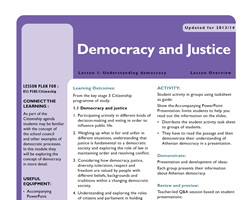New to Safeguarding Essentials?
Subscribe Now
|
Existing members
Sign in
here
Citizenship Lesson Plans / KS3 - Democracy - 4 lessons / Democracy Lesson Plan 1 - Understanding Democracy
There are 1 Documents available to download for
Democracy Lesson Plan 1 - Understanding Democracy
Using an example of the origins of democracy in Ancient Greece, students are introduced to the concept of democracy.

- TRS Citizenship Democracy Lesson 1 PDF Downloads = 104
Connect the Learning
As part of the Citizenship agenda students may be familiar with the concept of the school council and other examples of democratic processes. In this module they will be exploring the concept of democracy in more detail.The Big Picture
Teacher input:“This is lesson 1 of a series of 4 that will examine democracy through a variety of activities. It is important that young people understand something about the history of democracy and democratic processes to ensure their engagement with the voting process later in life, and to help them understand that they can effect social and political change.”
The Learning Outcomes
From the key stage 3 Citizenship programme of study:
1.1 Democracy and justice
1.Participating actively in different kinds of decision-making and voting in order to influence public life.
2.Weighing up what is fair and unfair in different situations, understanding that justice is fundamental to a democratic society and exploring the role of law in maintaining order and resolving conflict.
3.Considering how democracy, justice, diversity, toleration, respect and freedom are valued by people with different beliefs, backgrounds and traditions within a changing democratic society.
4.Understanding and exploring the roles of citizens and parliament in holding government and those in power to account.
Input/Introduction
Brief teacher-led discussion to establish initial level of student knowledge:What is democracy? Write the word on the board and ask the class if they know what it means. Take class feedback.

